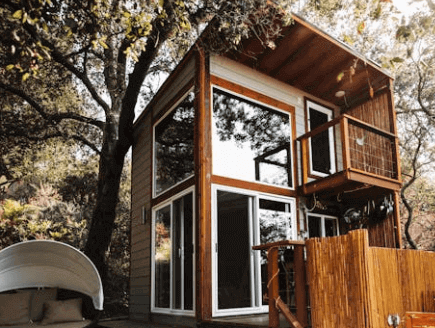The movement towards tiny homes or alternative housing has surged in popularity, driven by an increasing desire for minimalist living and sustainable lifestyles. Whether you’re a minimalist, a DIY enthusiast, a Florida land buyer, a real estate agent, or a property owner, understanding the nuances of buying land for tiny homes or alternative housing is crucial. This comprehensive guide delves into key considerations, strategies, and economic tips to help you decide when buying land for tiny homes or alternative housing.
Real estate investors Steve Daria and Joleigh recommend one of the first steps is thoroughly researching zoning laws and land use regulations in your target area. This ensures that the land you consider is suitable for a tiny home or alternative housing. Additionally, Steve Daria and Joleigh emphasize the importance of checking for essential utilities and infrastructure, such as water, electricity, and sewage systems, to avoid unexpected expenses later.
Understanding Tiny Homes and Alternative Housing
Tiny homes often range from 100 to 400 square feet, offering a compact living space emphasizing efficiency and simplicity.
Alternative housing can include anything from container homes and yurts to treehouses and cob houses.
Both options reflect a shift from traditional housing towards more sustainable, cost-effective, and flexible living solutions.

Why Choose Tiny Homes or Alternative Housing?
Before diving into tips for buying land for tiny homes or alternative housing, it’s essential to understand why tiny homes or alternative housing can be appealing:
Affordability
Lower construction costs make tiny homes and alternative housing options accessible to a broader range of budgets, making homeownership more attainable.
Additionally, reduced maintenance costs translate to significant savings over time, allowing homeowners to allocate resources to other priorities.
Sustainability
Tiny homes and alternative housing typically have a smaller ecological footprint, consuming less land and fewer resources during construction.
Many homes also incorporate eco-friendly materials and energy-efficient technologies, minimizing environmental impact.
Flexibility
One significant advantage of tiny homes and alternative housing is their mobility; they can often be relocated to new sites with relative ease, offering a dynamic living experience.
This flexibility also allows homeowners to modify and customize their living spaces to suit changing needs without the constraints of traditional construction.
Minimalism
Living in a tiny home or alternative housing encourages a decluttered lifestyle.
This approach focuses on essential possessions and reduces the accumulation of unnecessary items.
This minimalist design can lead to a more mindful and intentional way of life, promoting mental well-being and simplicity.
Get Started: Get Your Cash Offer Below…
We are direct land buyers. There are no commissions or fees and no obligation whatsoever. Start below by sharing where your property is and where we can send your offer…
Key Considerations When Buying Land for Tiny Homes or Alternative Housing
Understanding the essential factors in purchasing land for tiny homes or alternative housing is crucial for making informed decisions.
Zoning and Building Codes
Awareness of local zoning laws and building codes is paramount when purchasing land for tiny homes or alternative housing.
These regulations dictate what structures can be built and where they can be located.
Tips:
- Research Local Regulations: Check with local planning departments for specific zoning laws related to tiny homes or alternative housing.
- Consult with Experts: Engage with real estate agents or legal advisors specializing in unconventional housing.
- Look for Tiny Home-Friendly Areas: Some regions have embraced the tiny home movement and have more lenient regulations.
Utilities and Infrastructure
Assessing access to utilities and infrastructure such as water, electricity, and sewage disposal is critical for land selection.
Strategies:
- On-Grid vs. Off-Grid: Decide whether you want to connect to existing utility grids or prefer an off-grid solution like solar panels and composting toilets.
- Water Supply: Ensure adequate water sources, whether through municipal connections, wells, or rainwater harvesting systems.
- Sewage Solutions: Consider septic systems or composting toilets for waste management.
Land Suitability and Topography
The physical attributes of the land, including its topography and soil quality, significantly affect the feasibility of building tiny homes or alternative housing.
Considerations:
- Flat vs. Sloped Land: Flat land is generally easier and cheaper to build on, while sloped land may require additional engineering.
- Soil Type: Run a soil test to determine suitability for construction and potential gardening.
- Flood Zones: Avoid areas prone to flooding or ensure proper elevation and drainage solutions are in place.
Accessibility and Location
Accessibility and proximity to amenities are crucial for convenience and potential resale value.
Factors:
- Road Access: Ensure the land is accessible via well-maintained roads.
- Proximity to Amenities: Consider the distance to important facilities such as hospitals, clinics, grocery stores, and schools.
- Community and Lifestyle: Reflect on the type of community you want to be part of and the lifestyle you envision.
Budget and Financing
Setting an ideal budget and exploring financing options are fundamental steps when buying land for tiny homes or alternative housing.
Tips:
- Land and Construction Costs: Factor in the cost of land, site preparation, and construction expenses.
- Financing Options: Explore loans designed for land purchases or alternative housing projects.
- Hidden Costs: Be mindful of potential additional costs such as permits, surveys, and utility hookups.
Considerations:
- Protected Areas: Check if the land is within protected zones that may limit development.
- Deed Restrictions: Be aware of any deed restrictions affecting your building plans.
- Environmental Impact: Consider the environmental effects of your project and explore sustainable building practices.
Tips for Finding the Perfect Land
Finding the ideal piece of land for your tiny home or alternative housing requires patience and diligence. Here are some practical tips:
Use Online Resources
Websites like Zillow, LandWatch, and Realtor.com enable you to filter searches by applying specific criteria such as zoning and price.
Network with Local Realtors
Local realtors often have insider expertise and access to properties not listed online.

Visit Potential Sites
Always visit the land to assess its suitability and envision your future home.
Join Online Communities
Join in online forums and social media groups focused on tiny homes and alternative housing to gain insights and recommendations.
Conclusion
Buying land for tiny homes or alternative housing is a multifaceted venture that needs careful consideration and planning. By understanding key factors such as zoning laws, utilities, land suitability, accessibility, budget, and environmental restrictions, you can make up-to-date decisions that align with your goals and lifestyle.
Whether you’re a minimalist, a DIY enthusiast, a Florida land buyer, a real estate agent, or a property owner, this guide provides valuable insights to help you navigate the complexities of purchasing land for tiny homes or alternative housing.
As the movement towards sustainable and minimalist living expands, the demand for tiny homes and alternative housing will undoubtedly rise. Embrace the journey, do your homework, and take the first step towards having your ideal living space.
**NOTICE: Please note that the content presented in this post is intended solely for informational and educational purposes. It should not be construed as legal or financial advice or relied upon as a replacement for consultation with a qualified attorney or CPA. For specific guidance on legal or financial matters, readers are encouraged to seek professional assistance from an attorney, CPA, or other appropriate professional regarding the subject matter.
